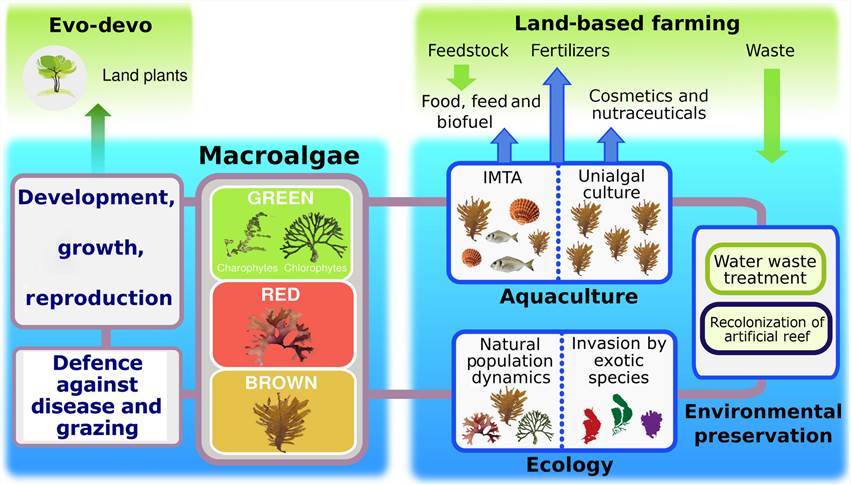Marine macroalgae, also known as seaweeds, refer to thousands of macroscopic, multicellular marine algae. They are widely used as ingredients for food, cosmetics, and fertilizers, as well as for producing hydrocolloids. As a global company focused on algae, Lifeasible offers various seaweed-related services and custom protocols. Our advanced technology platform will provide efficient and cost-effective seaweed science services to ensure your 100% satisfaction.
Seaweeds can be classified according to their pigmentation as brown (yellow algae phylum), red (red algae phylum), and green (green algae phylum). Seaweeds all play an integral role in the marine ecosystem. Species such as kelp can form extensive forests, provide shelter for the spawning of many species, and provide nursery grounds for larvae. Seaweeds help provide oxygen to the ocean and are one of the main producers in the marine food chain. In addition, some seaweeds have the ability to remove heavy metals from the water, potentially for biomonitoring and bioremediation of such pollutants. Seaweeds also have excellent survival strategies to withstand the many environmental stresses they are exposed to. For all these reasons, coupled with their unique life cycle and physiology, seaweeds are interesting subjects for research.
 Fig 1. Position of macroalgae in the scientific and societal landscapes. (Charrier B, et al., 2017)
Fig 1. Position of macroalgae in the scientific and societal landscapes. (Charrier B, et al., 2017)
Lifeasible is the leading developer of seaweed services. Our goal is to help plant scientists worldwide conduct scientific research on seaweed, including scientific trials, tests, and validated examinations of their nutritional value, bioactive components, seasonal and geographic variations, and their applications.
An important difference between seaweed and microalgae is that seaweeds are multicellular, while microalgae are unicellular. Similar to microalgae histology, we also provide histology services for seaweed, analyzing seaweeds' genome, proteome, transcriptome and metabolome. Similar to microalgal genetic engineering, we build a genetic model of seaweed that can be easily cultured in vitro, easily genetically modified, and detected, with a wide geographic distribution to analyze the molecular genetics of algae. We also use the abundance of microalgae to produce a large number of valuable biological products for industrial and agricultural needs.
Here, we offer the following solutions for seaweeds with high efficiency and strict quality standards.
Lifeasible continues to explore the potential of seaweed as we continue to delve into research and innovation. We are committed to providing professional, customized solutions for seaweed to our customers worldwide. We look forward to working with you to discover the fascination of seaweed in cooperation. If you are interested in our services, please feel free to contact us for more information about our services.
Reference
Lifeasible has established a one-stop service platform for plants. In addition to obtaining customized solutions for plant genetic engineering, customers can also conduct follow-up analysis and research on plants through our analysis platform. The analytical services we provide include but are not limited to the following:
Why Do Plants Blush When They Are Hungry?
April 26, 2024
STU-CRISPR System Improves Plant Genome Editing Efficiency
April 19, 2024